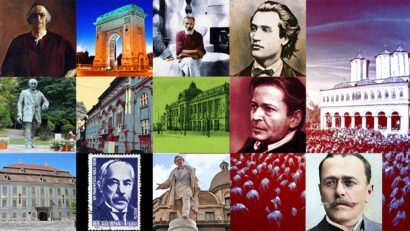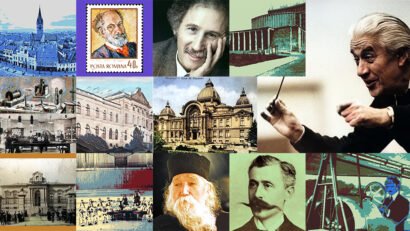Humorist Cilibi Moise
Romanian humor writing in the 19th century

Steliu Lambru, 26.08.2023, 14:00
Humor is a human trait, in its very essence. Humor has for long been described and analyzed by literary theorists, philosophers, moralists, psychologists, theologians, sociologists, anthropologists. Being admittedly universal, humor is at once something typical for certain groups of people, larger or smaller, for certain nations or countries. Humor is, just as those who studied it would put it, a cultural characteristic of a certain space.
Practically, in the Romanian space, humor could be traced ever since this space has been inhabited by human beings. Notwithstanding, the written history of Romanian humor, with documents conveying the spirit of the age to posterity, can only be read from the second half of the 19th century, being closely connected to the publication of satire and humor magazines. In the history of Romanian humor, we can also find names of people who made the others laugh, people who would be remembered by their contemporaries by their funny words, gestures and attitudes.
One such name of Romanian humor in the 19th century was that of the legendary Cilibi Moise, whose personality is better known from what the others said about him, rather than from his own personal notes or archive documents.
Eugen Istodor specializes in the history of humor press. Istodor himself was a columnist for the Catavencu Academy humor magazine, issued in 1991. In his articles and studies, Istodor also wrote about Cilibi Moise, our hero today.
How are we to understand humor ? How can we perceive it in the Romanian space ? So here I am in front of Cilibi Moise, the humblest of our great humorists. Why humble? A string of questions arises here as well. What do we know about Cilibi Moise? My honest answer is that we do not know nothing indeed. ‘Man cannot be something unless he feels he is nothing’ that is in fact his creed, and it is also my creed as well. We know nothing about him. We only have a photograph of him, we have some testimonials, we have several literary episodes, a couple of clippings. We can place him in an equation which belongs to literary history rather than literary theory, even to a less extent to literary criticism.
Cilibi Moise was born Moise Froim in Focsani, in 1812 and died in Bucharest, in 1870, at the age of 58. He hailed from an underprivileged Jewish family from Vrancea, in eastern Romania. Information sources abut Cilibi Moisse are scarce, telling us that ever since he was a child, he had no choice other than work or be into trading. They say Cilibi Moise came to be known among the traders thanks to his ludic spirit, strong enough in him to draw his clients. They also say Moise was illiterate and dictated to a type setter the proverbs, the aphorisms and the quotations that are attributed to him. We also understand that the great playwright Ion Luca Caragiale’ s father befriended Moise and that the latter dictated part of his creations to Caragiale himself. Despite the age gap, Cilibi Moise was quite close to rabbi, philologist, historian and journalist Moses Gaster. In his memoirs, Gaster names Moise cilibi, a word meaning the friendly one but also the smart one in Turkish. Philologist and literary historian Stefan Cazimir wrote that Moise got other nicknames as well, such as twicer, jester, sage, philosopher, but also the distinguished one, the noble one, the dapper. Cilibi Moise was the way he was also because, in his time, the people and the ways of the world were those of the century, just as Eugen Istodor told us.
He is the way he is because the Romanian society was in a certain way. He got his name included in literary history because he wanted to. Yet that was rather something pertaining to the instinct, to the social animal in him, than a trader. He would rather be a trader, or that’s what I suspect. He would have liked to be something else; he would have liked to be rich and live his life to the fullest. He remained somewhere on the margin, instead. Moise Froim Schwartz did not tell that many things about himself. His irony was self-inflicting, it’s true, but he told nothing about him. He didn’t tell who he was or how he was. That speaks volumes about how we structure the literary and social hierarchies and about how we relate to them ourselves. Moise, as compared to Caragiale, for instance, to Macedonski, Ranetti and Geo Bogza, told nothing about him. He stole himself into and lived his life behind some proverbs where his irony was self-inflicting. Cilibi Moise lives only through the way the others perceived him, through the way the others resorted to a certain kind of rhetoric.
Some of Cilibi Moise’s witticisms can be understood because their message is universal. For instance, it is Cilibi Moise who gave us this quotation about poverty: One day, Cilibi Moise ran into some kind of great shame. Thieves broke into his place at night and found nothing.
Politics and affluence can also be understood by today’s people, all the more so as at that time things were different. As for Moise, his comments on politics went something like : for 30 years since poverty has been living with me and for 14 years since I have been living with politics, I got tired of doing politics, but poverty did not get tired of living with me. These are just two examples of the 15-volume thesaurus Cilibi Moise left behind him, a thesaurus made of aphorisms, proverbs, thoughts, anecdotes and pieces of advice.




























